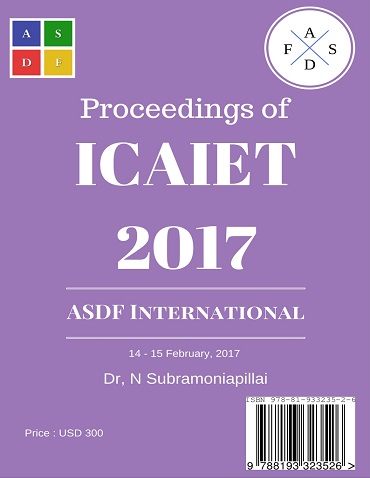- Publication Meta:Value
- Short Title:ICAIET 2017
- Publisher:ASDF, India
- ISBN 13:978-81-933235-2-6
- ISBN 10:81-933235-2-1
- Language:English
- Type:Hard Bound - Printed Book
- Copyrights:ICAIET Organizers / DCRC, London, UK
- Editor-in-Chief:Dr N Subramoniapillai
- Conference Dates:14 - 15, February 2017
- Venue Country:Kanyakumari, India
- Submitted Papers:389
- Acceptance Rate:8.10%
- Website:www.icaiet.com
Welcome to ASDF Electronic Digital Library!
ICAIET 2017
ICAIET 2017
International Conference on Advanced Innovations in Engineering and Technology 2017
Paper 036
Pre-treatment of Municipal Waste Activated Sludge by Using Thermo–Chemo Process
Rathika S1, Aiswarya M2
1,2Department of Civil Engineering, Rohini College of Engineering & Technology, India
Abstract
The organic fractions of municipal solid waste (OFMSW) usually contains high lignocelluloses and fatty fractions. These fractions are hard biodegradable substrate for biological treatments and its presence involves limitations on the performance of anaerobic processes. To avoid this, thermochemical pre–treatment has been applied on the OFMSW coming from a full-scale mechanical-biological treatments (MBT) plant, in order to prehydrolyze the waste and improve the organic matter solubilisation. Excess sludge disposal is one of the serious challenges in biological waste water treatment. Reduction of sludge production would be in an ideal way to solve sludge associated problems rather than the post treatment of the sludge produced. In this study, a new waste water treatment process combining anaerobic/anoxic/oxic system with thermochemical sludge pre-treatment was tested in a laboratory scale experiment. In this study, the effects of the sludge pre-treatment on the excess sludge production in anaerobic/anoxic/oxic were investigated. To study the stabilization yield, the increments of soluble organic matter have been measured in terms of dissolved organic carbon (DOC), soluble chemical oxygen demand (SCOD), total volatile fatty acids (TVFA) and acid genic substrate as carbon (ASC). The process variables analysed were temperature, pressure and NaOH dosage. The levels of work for each variable were 160-180-200°C, 3.5-5.0-6.5 bar and 2-3-4 g NaOH/I. In addition, the pre-treatment time was also modified for about 15 and 120 mints. Thus, predictably the application of this pre-treatment in this optimum conditions cloud improves the H2 production during the subsequent Dark Fermentation Process.
Keywords
Author's Profile
Author profile can be generated and linked through our partners World Book of Researchers. To include your profile online Click Here. After it is approved, please email to edlib @ asdf.res.in to create a link with all the papers.
e-AID
ICAIET.2017.036
Cite this Article as Follows
Rathika S, Aiswarya M. "Pre-treatment of Municipal Waste Activated Sludge by Using Thermo–Chemo Process." International Conference on Advanced Innovations in Engineering and Technology (2017): 18. Print.
© 2010 - by EDLIB .
All Rights Reserved.

